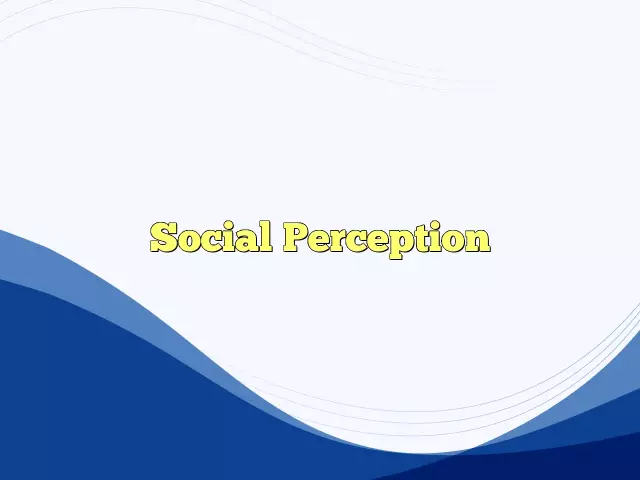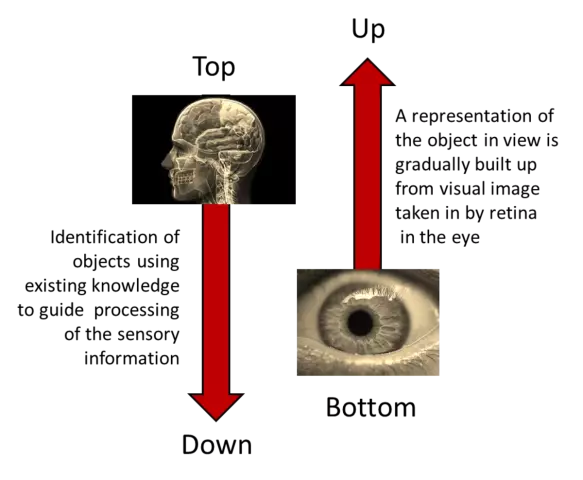- Author Rachel Wainwright wainwright@abchealthonline.com.
- Public 2023-12-15 07:39.
- Last modified 2025-11-02 20:14.
Social perception

There is such a thing as social perception, which translated from Latin (perceptio) means "perception". In relation to the psychology of society, the author considers how a person sees the situation, what conclusions he draws. And most importantly, psychologists note, what actions should be expected from this or that individual who belonged to a certain group of like-minded people.
Social perception is characterized by the following functions:
- Self-knowledge;
- Cognition of the interlocutor, partner;
- Establishing contacts in a team in the process of joint activities;
- Establishing a positive microclimate.
Social perception studies behavior patterns between individuals with different levels of development, but belonging to the same society, collective. Behavioral reactions are formed on the basis of social stereotypes, the knowledge of which explains communication patterns.
There are two aspects of social perception in the study of psychological compatibility processes. These are the following questions:
- Study of social and psychological characteristics of an individual subject and object of perception;
- Analysis of the mechanism of interpersonal communication.
In order to ensure the knowledge and understanding of another person, as well as oneself in the process of communication, there are special mechanisms of social perception that make it possible to make predictions about the actions of communication partners.
Mechanisms of social perception
The tools used by social perception provide for the establishment of communication between individuals and consist in the following concepts:
- Identification;
- Empathy;
- Attraction;
- Reflection;
- Stereotyping;
- Causal attribution.
The identification method is that the psychologist tries to put himself in the place of the interlocutor. To know a person, it is necessary to master his scale of values, norms of behavior, habits and taste preferences. According to this method of social perception, a person behaves in the way, in his opinion, the interlocutor would behave.
Empathy is empathy for another person. Copying the emotional mood of the interlocutor. Only by finding an emotional response, you can get a correct idea of what is going on in the soul of the interlocutor.
Attraction (attraction) in the concept of social perception is considered as a special form of cognition of a partner with a formed stable feeling for him. This understanding can take the form of friendship or love.
Reflection - awareness of oneself in the eyes of the interlocutor. When conducting a conversation, a person seems to see himself from the side of a partner. What the other person thinks of him and what qualities endows him with. Knowledge of oneself in the concept of social perception is impossible without openness to other people.
Causal attribution from the words "causa" is a cause and "attribute" is a label. A person is endowed with qualities in accordance with his actions. Social perception defines the following types of causal attribution:
- Personal - when the reason comes from the person himself who has committed this or that act;
- Object - if the reason for the action was the object (subject), to which this or that action was directed;
- Circumstantial - the conditions under which this or that act was committed.
In the process of research, according to social perception, patterns were identified that influence the formation of causal attribution. As a rule, a person attributes success only to himself, and failure - to others, or to circumstances that have developed, alas, not in his favor. When determining the severity of an action directed against a person, the victim ignores the objective and detailed causal attribution, taking into account only the personal component. An important role in perception is played by a person's attitude, or information about the perceived subject. This was proven by Bodalev's experiment, which showed a photograph of the same person to two different social groups. Some said that before them was a notorious criminal, others identified him as the greatest scientist.
A social stereotype is the perception of an interlocutor based on personal life experience. If a person belongs to any social group, he is perceived as part of a certain community, with all its qualities. A clerk is perceived differently from a plumber. Social perception shares the following types of stereotypes:
- Ethnic;
- Professional;
- Gender;
- Age.
When people from different social groups communicate, contradictions may arise, which are smoothed out when solving common problems.
Social Perception Effects
Based on stereotypes, interpersonal perception is formed, in which the following effects are determined:
- Primacy;
- Novelty;
- Halo.
The primacy effect in social perception manifests itself at the first meeting. The person's assessment is based on information previously obtained.

The effect of novelty begins to operate when completely new information appears, which is considered the most important.
The halo effect is manifested in the exaggeration of the positive or, conversely, negative qualities of the partner. This does not take into account any other arguments and abilities. In a word, "a master, he is a master in everything."
Pedagogical Social Perception
Pupils' perception of a teacher is determined by relationships within the educational process. Every teacher is interested in the opinion that forms his personality in the eyes of students. So pedagogical social perception determines the status of the teacher, his way of life. All this affects the creation of authority, or the lack of it, which inevitably affects the quality of education.
The ability to find a common language with initially socially unequal people, without losing a sense of a reasonable distance, testifies to the teacher's pedagogical talent.
Found a mistake in the text? Select it and press Ctrl + Enter.






